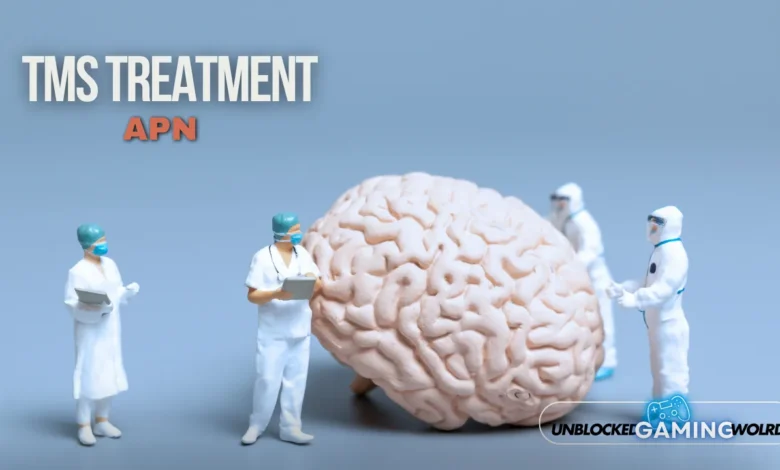Understanding TMS Treatment APN: A Comprehensive Guide

TMS Treatment APN is revolutionizing the way we address mental health challenges. This innovative therapy uses targeted magnetic pulses to stimulate brain activity, offering new hope for individuals struggling with depression and other mental health conditions.
Administered by Advanced Practice Nurses, TMS Treatment APN is a non-invasive and effective option for those who have not found relief through traditional treatments.
With its growing popularity and proven results, understanding how It works and its benefits is crucial for anyone considering this modern approach to mental wellness.
This comprehensive guide explores everything you need to know about It, from its mechanisms to its impact on mental health.
What is TMS Treatment APN?
Understanding TMS Treatment APN
TMS (Transcranial Magnetic Stimulation) Treatment APN is a specialized therapy used to treat certain mental health conditions, including depression. TMS is a non-invasive procedure that uses magnetic fields to stimulate nerve cells in the brain.
This stimulation helps improve symptoms related to depression and anxiety. The “APN” in TMS Treatment APN often refers to Advanced Practice Nurses who are trained to administer and manage this treatment.
They ensure that the TMS therapy is customized for each patient’s needs, providing a more personalized approach to mental health care. TMS is considered when other treatments haven’t worked, offering hope for individuals struggling with mental health issues.
How Does TMS Treatment APN Work?
TMS Treatment APN involves placing a magnetic coil near the patient’s head. The coil generates magnetic pulses that target specific areas of the brain responsible for mood regulation.
These pulses create small electrical currents, which can enhance brain activity and improve mood. The treatment is typically administered in a series of sessions, each lasting about 40 minutes.
Unlike traditional methods like medication, TMS does not require surgery or long recovery periods. Patients usually remain awake and alert during the treatment, making it a convenient option for those with busy schedules or who are hesitant about more invasive procedures.
Who Can Benefit from TMS Treatment APN?
Individuals with Treatment-Resistant Depression
TMS Treatment APN is particularly effective for individuals with treatment-resistant depression. This includes those who have tried multiple antidepressant medications without finding relief. Traditional treatments may not work for everyone, and TMS offers a new option for those who have not responded to other therapies.
The therapy’s ability to target specific brain areas involved in mood regulation makes it a promising alternative.
Patients with Anxiety Disorders
TMS Treatment APN is not limited to depression. It can also benefit patients with severe anxiety disorders. Many individuals with anxiety have found that conventional treatments, such as medications or cognitive behavioral therapy (CBT), do not fully alleviate their symptoms.
TMS can be an effective adjunctive therapy, providing additional relief and helping to manage anxiety symptoms more effectively.
Those Who Experience Intolerable Side Effects from Medications
For some individuals, antidepressant medications come with severe side effects that can hinder daily life. These side effects might include weight gain, sexual dysfunction, or gastrointestinal issues. It provides a non-invasive alternative without these adverse effects.
This makes it an appealing option for those who cannot tolerate traditional medications.
Patients Preferring Non-Medication Approaches
Some patients seek to avoid medications altogether due to concerns about long-term use or dependency. IT offers a non-medication approach to managing mood disorders.
It is suitable for those who prefer or require a treatment that does not involve drugs, aligning with their personal health goals and preferences.
Individuals with Major Depressive Disorder (MDD)
TMS is particularly beneficial for individuals diagnosed with Major Depressive Disorder (MDD). MDD is a serious mental health condition characterized by persistent sadness, loss of interest, and other debilitating symptoms.
It targets the brain’s mood-regulating areas, potentially leading to significant improvements in symptoms for those suffering from MDD.
Patients Seeking a Customized Treatment Plan
TMS Treatment APN is tailored to each patient’s specific needs. This personalized approach allows for adjustments based on individual responses and progress. Patients who have not found success with one-size-fits-all treatments may benefit from the customized nature of TMS, which adapts to their unique condition and therapeutic needs.
What Conditions Can TMS Treatment APN Address?
TMS Treatment APN primarily targets major depressive disorder (MDD), but it can also be used for other mental health conditions. These include generalized anxiety disorder (GAD), post-traumatic stress disorder (PTSD), and obsessive-compulsive disorder (OCD).
For these conditions, TMS therapy can help alleviate symptoms when other treatments have proven ineffective. The therapy works by targeting specific brain regions associated with mood regulation and emotional processing.
This targeted approach helps improve symptoms and overall well-being. As research continues, TMS might be used for additional mental health conditions in the future.
What to Expect During a TMS Treatment APN Session?
During a TMS Treatment APN session, patients will sit comfortably while a magnetic coil is placed on their head. The coil will deliver magnetic pulses to specific brain areas. Patients might feel a tapping or clicking sensation but generally do not experience pain.
Each session lasts about 40 minutes, and patients can return to their daily activities immediately afterward. There is no need for anesthesia or recovery time. Most patients undergo a series of sessions over several weeks.
The number of sessions needed can vary depending on individual responses and treatment goals.
Are There Any Side Effects of TMS Treatment APN?
TMS Treatment APN is generally well-tolerated, with minimal side effects. Common side effects include mild headaches, scalp discomfort, or muscle twitching at the site of the coil. These effects are usually temporary and resolve shortly after the session.
Unlike some medications, TMS does not carry risks of weight gain, sexual dysfunction, or cognitive impairment. Rarely, more severe side effects like seizures might occur but are extremely uncommon.
Patients should discuss any concerns with their healthcare provider before starting TMS treatment to ensure it is a suitable option for their needs.
How Effective is TMS Treatment APN?
TMS Treatment APN has been shown to be effective for many patients with depression and anxiety. Studies have demonstrated that TMS can significantly reduce symptoms and improve overall mood.
Research indicates that around 50-60% of patients experience substantial improvement in their symptoms, with many achieving full remission. The effectiveness of TMS can vary depending on individual factors such as the severity of the condition and previous treatments.
While not everyone responds to TMS, it offers a promising alternative for those who have not found success with other therapies.
How is TMS Treatment APN Different from Traditional Treatments?
TMS Treatment APN differs from traditional treatments like medication and psychotherapy in several ways. Unlike medications, which can have systemic effects and side effects, TMS targets specific brain regions directly.
It is non-invasive and does not require anesthesia or long recovery periods. Unlike psychotherapy, which involves talking through issues, TMS involves stimulating the brain using magnetic pulses.
This targeted approach can provide relief when other methods have failed. TMS is also a good option for those who prefer not to use medication or who have experienced intolerable side effects from conventional treatments.
What Are the Costs of TMS Treatment APN?
The cost of TMS Treatment APN can vary depending on the provider and the number of sessions required. Typically, each session costs between $300 and $500, and a full course of treatment may involve 20 to 30 sessions.
Many insurance plans now cover TMS treatment, but coverage can differ based on the plan and location. It is important for patients to check with their insurance provider to understand what costs will be covered and any out-of-pocket expenses they might incur.
Some providers may offer payment plans or financial assistance to help manage the costs.
Is TMS Treatment APN Covered by Insurance?
Many insurance plans now cover TMS Treatment APN, but coverage can vary. Typically, insurance will cover TMS if other treatments, such as medications and therapy, have been tried and failed.
Coverage often depends on factors like the patient’s diagnosis, treatment history, and the specific insurance plan. It is essential for patients to contact their insurance provider to confirm coverage details and any potential costs.
Some providers also offer financing options or payment plans to help with expenses. Checking with both the healthcare provider and insurance company can help ensure that TMS treatment is accessible and affordable.
Benefits of TMS Treatment APN
| Benefit | Description |
| Non-Invasive | TMS does not require surgery or anesthesia, making it less invasive. |
| Minimal Side Effects | Common side effects are mild and temporary, such as headaches. |
| No Recovery Time | Patients can return to their daily activities immediately. |
| Targeted Treatment | Directly stimulates brain areas related to mood regulation. |
| Effective for Depression | Proven to be effective for those with major depressive disorder. |
| Personalized Approach | Tailored to each patient’s specific needs and treatment goals. |
| FDA-Approved | Approved by the FDA for treating depression and other conditions. |
FAQ’S
What is TMS Treatment APN?
TMS Treatment APN uses magnetic pulses to stimulate the brain. It helps treat conditions like depression. Advanced Practice Nurses administer the therapy, customizing it for each patient’s needs.
How long does a TMS session last?
Each TMS Treatment APN session typically lasts about 40 minutes. Patients can return to their daily activities right after the session, with no need for recovery time.
What are the common side effects of TMS Treatment APN?
Common side effects of TMS Treatment APN include mild headaches and scalp discomfort. These effects are usually temporary and resolve shortly after the session.
How effective is TMS Treatment APN for depression?
TMS Treatment APN is effective for many patients with depression. Studies show that around 50-60% of patients experience significant improvement in symptoms.
Is TMS Treatment APN covered by insurance?
Many insurance plans cover TMS Treatment APN, especially if other treatments have failed. Patients should check with their insurance provider to confirm coverage and costs.
Conclusion
TMS Treatment APN offers a promising approach for managing mental health conditions like depression and anxiety. By using magnetic pulses to stimulate specific brain regions, it provides a non-invasive alternative to traditional treatments.
With minimal side effects and no need for recovery time, it presents a practical option for those who have struggled with other therapies. Its effectiveness is backed by research, making it a viable choice for many patients.
Insurance coverage is often available, but it’s crucial to confirm details with providers. TMS Treatment APN represents a significant advancement in mental health care, bringing new hope to those in need.




